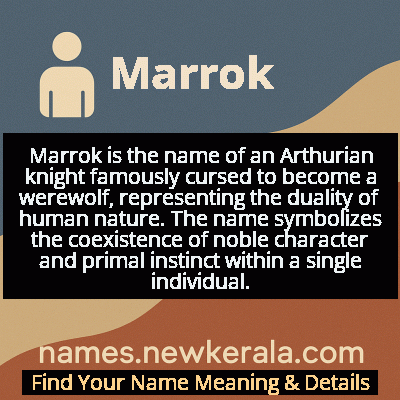Marrok Name Meaning & Details
Origin, Popularity, Numerology Analysis & Name Meaning of Marrok
Discover the origin, meaning, and cultural significance of the name MARROK. Delve into its historical roots and explore the lasting impact it has had on communities and traditions.
Name
Marrok
Gender
Male
Origin
Arthurian
Lucky Number
4
Meaning of the Name - Marrok
Marrok is the name of an Arthurian knight famously cursed to become a werewolf, representing the duality of human nature. The name symbolizes the coexistence of noble character and primal instinct within a single individual.
Marrok - Complete Numerology Analysis
Your Numerology Number
Based on Pythagorean Numerology System
Ruling Planet
Uranus (Rahu)
Positive Nature
Strong sense of order, loyal, practical, and disciplined.
Negative Traits
Stubborn, overly serious, rigid, and prone to feeling restricted.
Lucky Colours
Blue, gray.
Lucky Days
Saturday.
Lucky Stones
Blue sapphire.
Harmony Numbers
1, 7, 8.
Best Suited Professions
Managers, engineers, accountants, organizers.
What People Like About You
Dependability, discipline, practicality.
Famous People Named Marrok
Sir Marrok
Arthurian Knight
One of the Knights of the Round Table cursed to become a werewolf for seven years
Marrok of Cornwall
Legendary Knight
Known for his loyalty to King Arthur despite his supernatural affliction
Marrok the Wolf-Knight
Mythical Warrior
Symbol of inner conflict and the struggle between civilized and primal nature
Name Variations & International Equivalents
Click on blue names to explore their detailed meanings. Gray names with will be available soon.
Cultural & Historical Significance
What makes Marrok particularly significant is that he remains a virtuous knight even in wolf form, challenging simplistic notions of good and evil. His story explores whether true nobility resides in one's nature or one's actions. Unlike later werewolf narratives that emphasize monstrosity, Marrok's tale suggests that transformation doesn't necessarily corrupt one's essential character. This nuanced portrayal made him a compelling figure in medieval literature and continues to resonate in modern interpretations of Arthurian legend. His narrative serves as a bridge between Christian chivalric ideals and older Celtic shapeshifting traditions, embodying the cultural synthesis that characterizes much of Arthurian literature.
Extended Personality Analysis
Those bearing the name Marrok typically exhibit a complex personality marked by profound duality and depth. They often present as composed, principled individuals with strong moral compasses, yet beneath this civilized exterior lies intense passion, instinctual wisdom, and raw emotional power. This combination makes them both intellectually sophisticated and intuitively brilliant, capable of navigating complex social situations while maintaining connection to fundamental truths. Marroks tend to be fiercely loyal protectors of those they care about, embodying the knight's devotion while possessing the wolf's protective instincts.
Their life journey often involves learning to integrate seemingly contradictory aspects of their nature. They understand that strength comes not from suppressing one's wilder instincts but from channeling them constructively. This gives Marroks remarkable resilience and adaptability—they can be both strategic planners and spontaneous actors. They typically possess deep self-awareness and are often drawn to exploring the boundaries between different states of being, whether psychological, spiritual, or creative. Their personality reflects the wisdom that comes from having faced their own darkness and emerged with greater understanding rather than denial or fear of their complex nature.
Modern Usage & Popularity
In contemporary naming practices, Marrok remains an uncommon but meaningful choice, primarily selected by parents with specific interests in Arthurian legend, mythology, or unique literary names. Its usage has seen modest growth in recent decades, particularly within communities interested in fantasy literature, historical reenactment, and alternative naming traditions. The name appeals to those seeking masculine names with depth and narrative significance rather than mere popularity. While it doesn't rank on official baby name charts, it maintains a consistent presence in niche naming circles and among families valuing mythological heritage. Modern usage often reflects an appreciation for names that tell stories and carry symbolic weight, with Marrok particularly resonating in an era increasingly interested in exploring complex identity and the integration of different aspects of self.
Symbolic & Spiritual Meanings
Marrok symbolizes the fundamental human experience of containing multitudes—the civilized and the wild, the rational and the instinctual, the public persona and private self. It represents the transformative journey of integrating opposing forces into a cohesive whole. The name carries deep metaphorical significance about authenticity and self-acceptance, suggesting that true power emerges when we acknowledge and master all aspects of our nature rather than denying uncomfortable parts of ourselves. Symbolically, Marrok embodies resilience through transformation, the wisdom gained from navigating different states of being, and the courage required to face one's own complexity. It serves as a powerful reminder that our most challenging traits, when understood and directed, can become sources of unique strength and insight rather than weaknesses to be suppressed.

